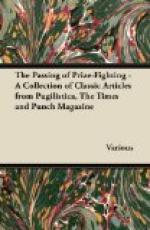“In ancient and heroic days,
The days of Scipios and Catos,
The Western world pursued its ways
Triumphantly without potatoes.”
If, however, the shortage of cereals demands that potatoes should be used as a substitute for wheat, I suggest that, instead of being subjected to the barbarous treatment described above, they should be granted a painless death by chloroform or some other anaesthetic.
I am, Sir, yours truly,
POTATOPHIL.
* * * * *
ERIN’S INCUBUS.
SIR,—A great deal of fuss is being made over Irish potato-cakes. Why Irish? The tradition that the potato is the Irish national vegetable is a hoary fallacy that needs to be exploded once and for all. It is nothing of the sort. The potato was introduced into the British Isles by Sir WALTER RALEIGH, a truculent Elizabethan imperialist of the worst type, transplanted into Ireland by the English garrison, and fostered by them for the impoverishment of the Irish physique. The deliberations of the National Convention now sitting in Dublin will be doomed to disaster unless they insist, as the first plank of their programme, on the elimination of this ill-omened root. If ST. PATRICK had only lived a few centuries later he would have treated the potato as he did the frogs and snakes.
I am, Sir, Yours rebelliously,
SHANE FINN.
***
A DANGEROUS DISH.
SIR,—May I put in a mild caveat against excessive indulgence in potato-cakes, based on an experience in my undergraduate days at Trinity College, Cambridge, when WHEWELL was Master? One Sunday I was invited to supper at the MASTER’S, and a dish of potato-cakes formed part of the collation. WHEWELL was a man of robust physique and hearty appetite, and I noted that he ate no fewer than thirteen, considerably more than half the total. Whether it was owing to the unlucky number or the richness of the cakes I cannot say, but the fact remains that the MASTER was seriously indisposed on the following day and unable to deliver a lecture on the Stoic Philosophy, to which I had greatly looked forward. I cannot help thinking that PYTHAGORAS, who enjoined his disciples to “abstain from beans,” would, if he were now alive, be inclined to revise that cryptic precept and bid us “abstain from potatoes,” or, at any rate, from over-indulgence in hot potato-cakes.
I am, Sir, Yours faithfully,
CANTAB.
***
WANTED—A NEW NAME.
SIR,—If a thing is to make a success a good name is indispensable. The potato has been handicapped for centuries by its ridiculous name, which is almost as cumbrous as “cauliflower” and even more unsightly to the eye. It is futile to talk of a “tuber” since that means a hump or bump or truffle. No, if you are to get people to eat potato-cakes you must devise a more dignified and attractive name; and it would be good policy for the FOOD CONTROLLER to offer a large prize for the best suggestion, Mr. EUSTACE MILES, Mr. EDMUND GOSSE and Mr. HALL CAINE to act as adjudicators.




